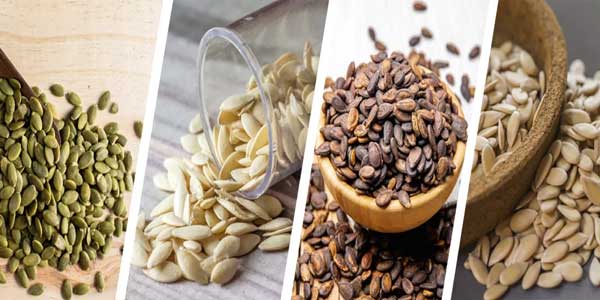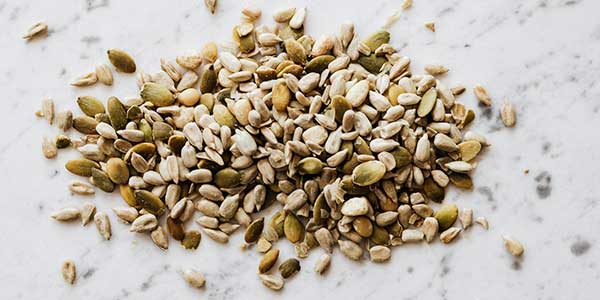Introduction:
In the world of culinary exploration, there are countless ingredients that add flavor, texture, and nutrition to our dishes. One such versatile ingredient is “Four Seeds” or “Char Magaz.” This unique blend of four different seeds has been used in traditional cooking for centuries, not only for their taste but also for their numerous health benefits. In this article, we will delve into the details, including their uses, qualities, origin, sources, production, applications, health benefits, how to use them in cooking, and potential side effects.
What are Four Seeds (Char Magaz)?
Also known as Char Magaz in Hindi, is a combination of four different types of seeds: watermelon seeds, muskmelon seeds, pumpkin seeds, and cucumber seeds. These seeds are typically obtained from the respective fruits after drying and processing. The name “Char Magaz” originates from the Urdu language, where “Char” means four and “Magaz” refers to the inner kernel or seed.
Qualities and Characteristics of Four Seeds:
Each type of seed in Four Seeds possesses unique qualities and characteristics, contributing to the overall flavor and nutritional composition of this blend. Let’s explore the qualities of each seed:
a) Watermelon Seeds: Watermelon seeds are small, oval-shaped seeds with a white or off-white color. They have a mild, nutty flavor and a crunchy texture. Watermelon seeds are a good source of protein, healthy fats, vitamins, minerals, and antioxidants.
b) Muskmelon Seeds: Muskmelon seeds, also known as cantaloupe seeds, are small, flat, and light brown in color. They have a slightly sweet and nutty taste. Muskmelon seeds are rich in protein, dietary fiber, healthy fats, vitamins, and minerals.
c) Pumpkin Seeds: Pumpkin seeds, often referred to as pepitas, are flat, oval-shaped seeds with a dark green outer shell and a white inner kernel. They have a rich, nutty flavor and a chewy texture. Pumpkin seeds are a great source of protein, dietary fiber, healthy fats, vitamins, minerals, and antioxidants.
d) Cucumber Seeds: Cucumber seeds are small, pale green seeds found in the center of cucumbers. They have a subtle, fresh flavor and a tender texture. Cucumber seeds are low in calories and contain a good amount of dietary fiber, vitamins, minerals, and antioxidants.

Origin and Sources of Four Seeds:
The origins of Four Seeds can be traced back to the Indian subcontinent, where they have been an integral part of traditional cuisine for centuries. Watermelon, muskmelon, pumpkin, and cucumber are commonly grown fruits in many regions around the world. The seeds are extracted from these fruits and dried to preserve their freshness and nutritional value. Today, these are readily available in grocery stores, health food stores, and online platforms as a popular cooking ingredient.
Production Process of Four Seeds:
The production process of Four Seeds involves several steps to ensure their quality and safety for consumption:
a) Seed Extraction: The seeds are extracted from the respective fruits by scooping them out or separating them manually.
b) Cleaning: The extracted seeds are thoroughly cleaned to remove any debris or impurities. This step helps maintain the quality and purity of the seeds.
c) Drying: The cleaned seeds are spread out on a clean, dry surface or a tray and left to dry naturally or using low heat. Drying helps remove excess moisture and prevents the seeds from spoiling.
d) Roasting (Optional): Some varieties may undergo roasting to enhance their flavor and texture. The roasting process involves heating the seeds in a dry pan or oven until they turn slightly golden or release a pleasant aroma.
e) Packaging: Once the seeds are dried and optionally roasted, they are packaged in airtight containers or bags to maintain their freshness and extend their shelf life.
Culinary Uses and Applications:
With their unique blend of flavors and textures, can be used in a variety of culinary applications. Here are some popular uses of Four Seeds in cooking:
a) Snack: Four Seeds make a nutritious and delicious snack on their own. You can enjoy them roasted or raw, sprinkled with a pinch of salt or your favorite seasoning.
b) Trail Mixes: Add to homemade trail mixes along with other nuts, dried fruits, and granola for a healthy and energy-boosting snack.
c) Baking: Incorporate into baked goods such as bread, cookies, muffins, and bars to add a delightful crunch and nutritional boost.
d) Toppings: Sprinkle on salads, soups, stews, yogurt, smoothie bowls, and breakfast cereals to enhance their taste, texture, and nutritional value.
e) Indian Sweets: Are commonly used in Indian sweets and desserts like halwa, barfi, laddu, and kheer to provide a unique texture and flavor.
f) Garnish: Use them as a garnish for various dishes, including curries, rice, and vegetable preparations, to add visual appeal and a subtle nutty taste.

Health Benefits of Four Seeds:
These seeds offer an array of health benefits due to their nutrient-rich composition. Let’s explore the potential health benefits of consuming Four Seeds:
a) Nutritional Powerhouse: Are packed with essential nutrients, including protein, dietary fiber, healthy fats, vitamins, minerals, and antioxidants. These nutrients play vital roles in maintaining overall health and well-being.
b) Heart Health: The presence of healthy fats, such as omega-3 fatty acids and monounsaturated fats, can help promote heart health by reducing cholesterol levels, improving blood pressure, and supporting cardiovascular function.
c) Digestive Health: The high dietary fiber content aids in digestion, prevents constipation, and supports a healthy gut microbiome. It can help regulate bowel movements and promote overall digestive health.
d) Energy Boost: Provide a good amount of protein, healthy fats, and carbohydrates, making them an excellent energy source. Including these seeds in your diet can provide sustained energy throughout the day.
e) Antioxidant Properties: The presence of antioxidants helps protect the body against oxidative stress and damage caused by free radicals. Antioxidants play a crucial role in reducing the risk of chronic diseases and promoting overall health.
f) Bone Health: Four Seeds contain essential minerals like calcium, magnesium, phosphorus, and zinc, which contribute to maintaining healthy bones and teeth. Regular consumption of may help reduce the risk of osteoporosis and promote bone density.
g) Weight Management: The combination of protein, dietary fiber, and healthy fats can promote satiety, reduce appetite, and aid in weight management by preventing overeating and promoting feelings of fullness.
h) Nutrient Absorption: Contain fat-soluble vitamins, such as vitamin A, vitamin E, and vitamin D, which require the presence of healthy fats for optimal absorption. Including Four Seeds in meals can enhance the absorption of these vitamins.
How to Use Four Seeds in Cooking:
Here are some tips on how to use Four Seeds in your culinary adventures:
a) Raw: Enjoy Four Seeds as a raw snack or sprinkle them over salads, smoothie bowls, yogurt, or breakfast cereals.
b) Roasted: Roasting can enhance their flavor and crunch. You can roast them in a dry pan or in the oven at a low temperature until they turn slightly golden.
c) Ground: Grind into a fine powder using a spice grinder or mortar and pestle. Use this powdered form in baking or as a seasoning for various dishes.
d) Mixes and Blends: Combine with other nuts, seeds, or dried fruits to create custom trail mixes, granola bars, or homemade muesli.
e) Toppings and Garnishes: Sprinkle on top of your favorite dishes, such as curries, stir-fries, roasted vegetables, or desserts, to add a crunchy texture and nutty flavor.
Potential Side Effects of Four Seeds:
While offer numerous health benefits, it’s important to consume them in moderation and be aware of potential side effects:
a) Allergic Reactions: Individuals with known allergies to any of the seeds in Four Seeds should avoid consuming them. Allergic reactions may include itching, hives, swelling, or difficulty breathing. Seek medical attention if any allergic symptoms occur.
b) High Calorie Content: While nutrient-dense but also high in calories. If you’re watching your calorie intake, be mindful of portion sizes to avoid excessive calorie consumption.
c) Digestive Issues: Some individuals may experience digestive issues such as bloating, gas, or discomfort when consuming. If you have a sensitive digestive system, start with small quantities and gradually increase as tolerated.
d) Oxalate Content: Pumpkin seeds, one of the components of Four Seeds, contain oxalates. Individuals prone to kidney stones or with certain kidney conditions should consume pumpkin seeds in moderation.
Conclusion:
Four Seeds, the blend of watermelon seeds, muskmelon seeds, pumpkin seeds, and cucumber seeds, offer a delightful combination of flavors, textures, and health benefits. With their versatile culinary uses, nutrient-rich composition, and potential health-promoting properties, can be a valuable addition to your kitchen pantry.
Whether enjoyed as a snack, used in baking, or incorporated into various dishes, they provide a unique twist to your culinary creations while offering a range of nutritional benefits. As with any ingredient, it’s important to consume them in moderation and be mindful of any potential allergies or side effects. So, embark on a flavorful journey and explore the world of Four Seeds to enhance your cooking and nourish your body.
Sources:
Goyal, A., Sharma, V., Upadhyay, N., Gill, S., & Sihag, M. (2014). Flax and flaxseed oil: an ancient medicine & modern functional food. Journal of food science and technology, 51(9), 1633-1653.
Kajla, P., Sharma, A., & Sood, D. R. (2015). Flaxseed—a potential functional food source. Journal of food science and technology, 52(4), 1857-1871.
Prasad, K. (2014). Dietary flaxseed in prevention of hypercholesterolemic atherosclerosis. Atherosclerosis, 233(1), 357-365.
Rodriguez-Leyva, D., Dupasquier, C. M., McCullough, R., Pierce, G. N., & Canadian Centre for Agri-Food Research in Health and Medicine. (2010). The cardiovascular effects of flaxseed and its omega-3 fatty acid, alpha-linolenic acid. Canadian Journal of Cardiology, 26(9), 489-496.
Torki, M., Akbari, M., & Zangeneh, M. M. (2018). Effect of flaxseed oil omega-3 fatty acids supplementation on body composition in overweight and obese adults: a systematic review and meta-analysis of randomized controlled trials. Diabetes & metabolic syndrome, 12(5), 591-596.